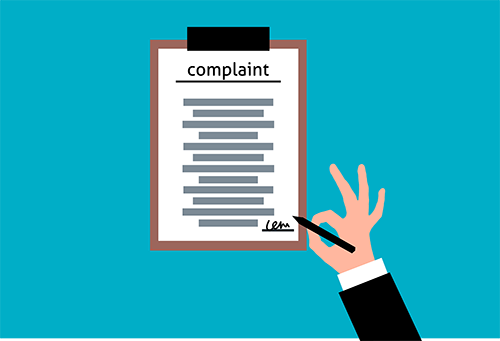- Winter 2022
- Responding to complaints: the retained solicitor's perspective

No matter how well-intentioned or well-advised, all practising barristers are at risk, at some stage of their careers, of being the subject of a disciplinary complaint. Below I provide some practical guidance to barristers facing this ordeal, which I have drawn from my experience in acting for many dozens of barristers in disciplinary matters over the last 15 years.
Responding to a complaint
In New South Wales, disciplinary complaints are made to or by, the Legal Services Commissioner.2 The commissioner refers many complaints about barristers to Bar Council for investigation by a Professional Conduct Committee.
Complaints can be made by anyone. Sometimes it is an opposing counsel or party, sometimes it is the court. But in many instances it is the (former) client of the barrister.
For many barristers, the first indication of a complaint is a letter from the Bar Association’s professional conduct section. That first letter often simply informs the barrister of the complaint – and does not seek any input from the barrister at that time. The letter usually recommends the barrister consider referring the matter to his or her professional liability insurers, and sometimes also reminds the barrister of the availability of support through BarCare.
I definitely recommend that any barrister receiving this letter notify his or her professional indemnity insurers, and reads the wording of their insurance policy. Although it can affect a barrister’s premium (see below), the whole idea of insurance is to assist an insured in a time of need. Not every policy responds to every complaint – but having an insurer’s support can be of real assistance, both practical and psychological. Of course, I would also recommend the barrister asks the insurer to appoint competent solicitors. Not all insurers will wish to appoint solicitors at the early stages. Depending on the policy wording, the barrister is likely to have rights to insist that solicitors be retained, and to choose who is appointed.
In addition, I would urge barristers to obtain non-legal support where possible. Professionals often underestimate the emotional burden which complaints impose. This is irrespective of whether the complaint is well founded or baseless. I always remind barristers that they work in a very solitary profession, where even the closest colleagues are competitors in one way or another. So sharing the fact of a complaint, and describing the conduct underlying it, may not come easily.
BarCare is available to all local practising barristers and sharing the fact of a complaint with a trusted confidant can ease the burden on the barrister.

The role of the solicitor appointed by the insurer
Some of my colleagues may take a different view, but in my mind, the sole responsibility of any solicitor appointed by the insurer is to achieve the best possible outcome for the barrister.
This is a different dynamic to civil actions where the insurer has a contractual right to assume conduct of the defence of the claim, and a financial stake in the outcome. The barrister is fully indemnified for what is at stake in the action – damages.
By contrast, in a disciplinary matter, the interests of the insurer and the barrister are not so neatly aligned. The insurer may wish to minimise legal costs by not appointing lawyers, or seeking to direct them to achieve a speedy outcome no matter the result. The barrister of course may have a different view given the issue of concern is his or her professional reputation and ability to practise.
To act for the barrister, the appointed solicitor needs a detailed account of the relevant events. In my experience I often encounter difficulties in obtaining this vital information from the barrister. There are at least three reasons for this.
First, my appointment by insurers sometimes means the barrister thinks I will prefer the interests of the insurer over those of the barrister, and is reluctant to disclose information which may be used against the barrister.
Second, barristers often wish to protect their (former) client and do not wish to disclose confidential communications. This occurs even when the client is the complainant and so there is a statutory waiver of client legal privilege and confidentiality obligations.3
Third, barristers can need reminding that I am their lawyer, so that privilege attaches to any confidential information they disclose to me. I cannot and will not disclose it without their instructions.
None of the above is a great reason to jeopardise an efficient defence of the disciplinary complaint and I work hard to overcome these obstacles each time they arise.
In addition to the above, there are the usual ‘mental blocks’ which often impede a barrister from coming to grips with a complaint. Back in the days of hard copy communications, one of our clients used to leave all correspondence from the Bar Association unopened, and would hand it to us when we came to chambers. That is not a model to emulate!
Dealing with a complaint
Many barristers are able to respond quite appropriately and adequately to a complaint. My role in those cases is quite limited and sometimes I do little more than act as a mailbox between the barrister and the bar.
In those instances, the barristers have remembered the principles of advocacy which they use in their daily business. They remember that the best advocacy separates fact from assertion, provides reasoning why a version of facts would be preferred, and dispassionately identifies and addresses the matters which are truly in dispute.
Human nature being what it is, it is only rarely that a barrister has managed all of this. A complaint often arises where there has been a breakdown in relations between the client and the barrister. Often the barrister has not been paid. Sometimes the barrister is ashamed of their conduct. More often than not, extrinsic stresses (financial, family, relationships) supervene. These matters can all affect a barrister’s ability to take a dispassionate approach in preparing a complaint response.
A demonstration of respect and compassion for the complainant can be very useful – no matter who the audience.
The best responses seek to identify the conduct which is truly the subject of complaint. This can be difficult as complainants rarely know the precise conduct causing them concern, and their complaints are often repetitive. They are most often unrepresented and have little faith in the legal profession. Properly identifying the complaint is important both to acknowledge the complainant’s concerns, and because if a key aspect is overlooked, it can lead to an impression that the barrister is ignorant of wrongdoing.
The best responses contextualise, but don’t downplay, the conduct. They explain, often by reference to extrinsic objective material, the sequence of events, including events not known to the complainant. This can demonstrate how the conduct occurred, even if it may not excuse it. Of course there are times when a complaint is entirely spurious, but a recognition of how the complainant may be aggrieved, as opposed to a mere denial of any wrongdoing, can more quickly achieve a beneficial outcome for the barrister.
The best responses also demonstrate an awareness of the broad audience who will see the response. While submissions may take the form of a letter addressed to the Bar Association, an important audience is the complainant. A demonstration of respect and compassion for the complainant can be very useful – no matter who the audience. Sometimes the real cause of the complaint has been a failure by the complainant to understand a court process. Recognising that failure, and carefully explaining the process, can see complaints finalised more quickly.
The best responses acknowledge wrongdoing where it has occurred, and also acknowledge how the wrongdoing has harmed the complainant (if it has) and the profession. They demonstrate intrinsically how the barrister has recognised and learnt from the experience.
Ultimately, the aim of a response is to explain the circumstances in which the conduct occurred and to demonstrate that the barrister has given real consideration to the professional or ethical issues involved.
While barristers can of course do all the above, I most often advise barristers that any submissions should come under the letterhead of the solicitor appointed to act. The appointment of solicitors goes some way to demonstrate that the barrister has insight as to the seriousness of the matter. Moreover, the input of someone who is independent of the complaint is likely to increase the degree of objectivity brought to the response.
Avoiding (or dealing with the consequences of) an adverse finding
Probably the most significant factor for the decision-makers is whether the barrister has demonstrated insight into the conduct complained of. It can be hard for a barrister to demonstrate that insight when, at the same time, legitimately seeking to downplay its significance. This is the area where judgment calls and experience are vital – knowing that an adverse finding is likely provides an opportunity to express regret at the earliest stage. But knowing where a more advantageous outcome is possible is the opportunity for good advocacy to achieve the desired result. This is another reason why independent input (for example, from a good solicitor) can be vital.
If adverse findings are made or foreshadowed by the decision-maker, that information may be useful in working out the remedial steps to be taken. These can reduce the severity of the outcome for the barrister.
For instance in a recent NCAT decision4 in which I recently acted for the solicitor involved, the solicitor (using his own initiative), wrote to all existing clients informing them of disciplinary findings which had been made against him. When the tribunal came to consider the sanctions to be imposed upon him subsequent to those findings, it looked very favourably on his recognition and disclosure of the adverse findings5. That is a relatively rare circumstance, but it likely assisted the solicitor to a significant extent in that case.
An apology to the complainant can certainly help. However, the timing and content of the apology is vitally important. An apology made immediately after a complaint (however well-intentioned) can risk being seen as an effort to stymie the process or silence the complainant. Evidently, it is preferable to avoid those impressions being drawn.
In some instances, testimonial evidence may be helpful, but those instances are relatively limited. In most cases the decision-maker is considering the barrister’s conduct, and so evidence of a barrister’s otherwise good character is of limited relevance. There are instances where the barrister’s character is the subject of consideration and so character evidence may be more relevant. But even in these cases, the tribunal can sometimes give the evidence little weight.
Effect on insurance premiums
Many members of the bar would be aware of the decision in EFA6 and the evidence provided to the court in that case (by one of my colleagues) as to the effect of the complaint on EFA’s professional indemnity insurance premiums.7
I usually advise my clients that there are a range of factors which affect premiums. Certainly one factor is the existence of a complaint. Any claim or complaint can initiate a claims history within the insurer, and in some instances that can immediately lead to a loading on premium on renewal. That loading will be higher if the claim is prolonged, or if a substantial reserve is raised against the claim. Those were the sorts of matters which were detrimental to EFA, and have affected a number of barristers for whom I am presently acting. In one instance a client of mine, who had just one complaint (subsequently finalised at minimal cost) could not afford the seven-fold increase in insurance premiums and has now left the bar.
However, there are other matters which affect premium beyond a claims history. Perhaps the most significant is that the mandatory professional indemnity scheme for barristers in New South Wales is a small market. This has meant that a small number of large losses can quickly affect an entire portfolio. This volatility can in turn lead to insurers exiting the market. Each time that occurs, the barristers the insurer formerly covered must seek insurance elsewhere in the market – at a time when conditions are so tight an insurer has left the market. Market forces then operate to see an increase in premiums for those forced to move insurers.
Additionally, across all professional indemnity spheres over the last few years, there has been a ‘hardening’ of the market within Australia, meaning that premiums are higher and policy coverage more constrained than has existed for many years previously.
Within reason, the best approach to reducing the impact on premium is for the barrister to provide a large degree of cooperation with a view to having the complaint determined as rapidly as possible.
General lessons
Being subject to a complaint is almost a professional hazard, given the situations in which barristers act – where rights are being argued about and determined, and where people feel extremely strongly about the outcome.
My general recommendation is to involve insurers as early as possible and naturally enough, to similarly involve independent solicitors. Failing this, I would urge barristers to speak to their colleagues to assist in attaining a degree of objectivity in any response provided to a complaint. BN

ENDNOTES
1 Ian Denham is a partner of Moray & Agnew Lawyers who specialises in acting for barristers and solicitors in disciplinary claims and professional negligence actions. Ian has acted for many dozens of NSW barristers in this capacity, on instructions from professional indemnity insurers and on direct instructions from barristers.
2 Legal Profession Uniform Law (NSW) No 16a of 2014, s 267.
3 Legal Profession Uniform Law (NSW) No 16a of 2014, s 321.
4 Council of the Law Society of New South Wales v Kernaghan (No 2) [2022] NSWCATOD 64 at [71].
5 Kernaghan at [71].
6 Council of the New South Wales Bar Association v EFA (a pseudonym) [2021] NSWCA 339.
7 EFA at [183].
